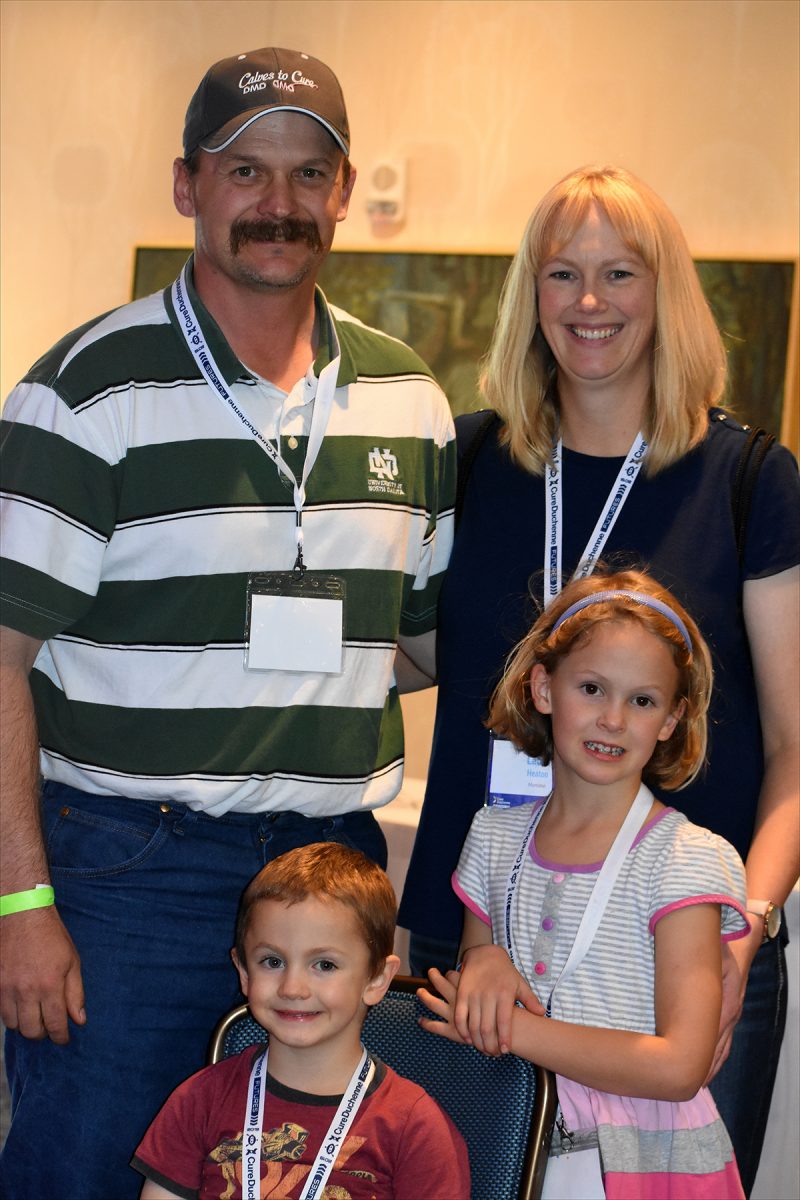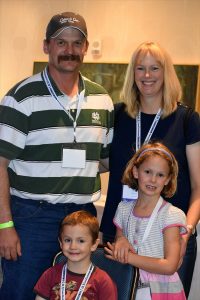Montana Rancher’s ‘Calves to Cure DMD’ Funds Duchenne Research
Written by |

Paul and Laura Heaton, with their children, Grant and Elyse. The Heatons, who live near Billings, Montana, recently launched the nonprofit organization Calves to Cure DMD. (Photo by Larry Luxner)
Montana, the fourth-largest U.S. state in area, also is one of the least-populated — with maybe half a dozen Duchenne muscular dystrophy patients among its 1.1 million inhabitants.
One of them is 5-year-old Grant Heaton, the son of cattle ranchers Paul and Laura Heaton. Diagnosed with Duchenne at age 3, Grant has a duplication of exons 3 through 6 in the DMD gene. (Exons are tiny bits of DNA used to make proteins)
“Intellectually he’s OK and doing fine for now, but he walks slowly,” said his father, interviewed at the 2019 Futures conference in Los Angeles and organized by the nonprofit group CureDuchenne.
“The disease has progressed in the last two years, so we’re doing modifications to the house. We built a cement ramp to get a wheelchair up to the deck, added handrails and redid our bathrooms to make them more accessible down the road,” said Heaton. “We’re trying to be pro-active.”
The Heatons, who live in Worden, Montana, also have devised a novel way to publicize their son’s disease: an annual livestock auction to raise money for Duchenne research.
“We just came up with the name and the idea, and started doing it,” said Heaton, 41, who owns a company that builds barbed-wire fencing. His wife, Laura, has an engineering degree from the University of North Dakota.
He said a livestock auction makes perfect sense for Montana, whose main industry is agriculture.
“There are lots of fundraising walks and runs out there,” said Heaton, “but we were looking for something different that fits in with our family. Grant and his sister, Elyse, like chasing cows and riding horses. We also use horseback riding for part of his physical therapy.”
Last year, the Heatons started a Facebook page — Calves to Cure DMD — then printed brochures announcing their upcoming auction. They also called friends around the state and generated media coverage by a Billings radio station as well as the local Yellowstone County News and Western Ag Reporter, a livestock industry newspaper.
Finally, in September, after securing permission from the Billings Livestock Commission, the auction took place. About 30 head of cattle were sold, raising $17,000 for Duchenne research.
“People donated either the whole check from selling their animal, or a set dollar amount,” he said, explaining that a 2,000-pound bull can go for 80 cents a pound, or $1,600.
“Nobody’s ever done this,” Heaton said. “I don’t know a better group of people set up to understand genetics than livestock producers. They’re up on everything that has to do with genetics, and I’ve been around it all my life.”
The Heatons expect to organize another livestock auction in September.
“You start calving in the spring, and in the fall, by the time that calf is 500 to 600 pounds, you set up with a buyer for a negotiated price,” he explained. “The animals are usually the same size and weight. If you have 200 calves, figure half are steers and half are heifers. But there are always some animals that don’t get shipped at shipping time. Some people donated old cows at the end of their productivity. Other people just donated cash.”
All the money the Heatons are raising goes directly to CureDuchenne.
Meanwhile, Grant continues to see his doctors in Billings; once a year, the family travels to the Shriners Hospital for Children in Spokane, Washington, which treats Duchenne patients. He also attends a local elementary school, where the teachers have been briefed about the disease.
“We kind of lucked out,” Heaton said. “There was a boy with Duchenne who passed away 8 or 10 years ago, so there’s some experience in the school system. We were also put in contact with another couple in Bismarck, N.D., that has a son named Grant who used to live in Billings.”
Last June, Grant started taking Emflaza (deflazacort), a corticosteroid manufactured by PTC Therapeutics that can cost anywhere from $35,000 to more than $100,000 a year depending on a patient’s weight. But getting the family’s insurer to pay for it was exhausting, Heaton said.
“It took us six months to get approval for Emflaza. We got denied and then had to appeal,” he said. “We won that fight, and when we have to redo our insurance, if we have to do it again, we’ll do it again.”
Asked how much the next livestock auction might generate, Heaton said he really has no clue.
“I was surprised how much we raised, but I don’t care. To us, the important thing is that all the money goes to research,” he said. “Talking to people whose boys are now in clinical trials, we realized that this might be too late for Grant. But maybe the next kid can have a chance.”






